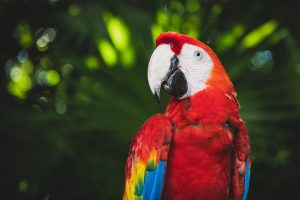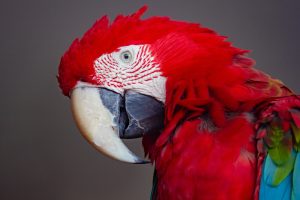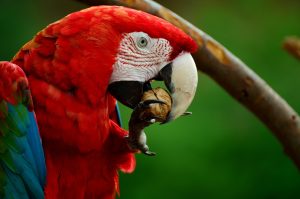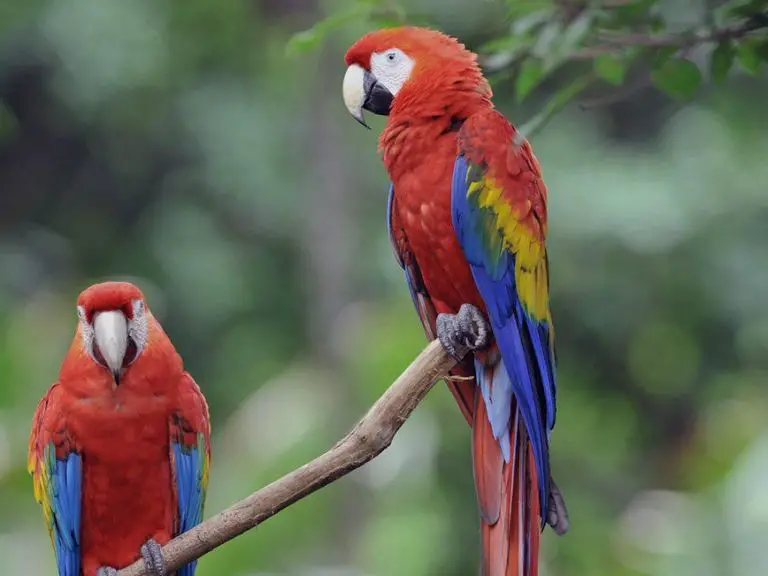How long do macaws live? Macaws lifespan is a difficult question that is based on several factors including where they live, the type of care they are subject to, and the individual sub-species themselves.
Generally, macaws lifespan is 25 years to 60 years, depending on many factors such as habitat, food, and breeds.
Sometimes the lifespan is longer than expected, considering the facts of living.
The highest lifespan of a macaw named Charlie has been claimed as 114 years, the oldest macaw survived.
Read on to discover the wide variety of macaws that are available and how long you can expect one to live if you invite it into your home.
In The Wild Macaws Lifespan

You will notice that the lifespan of most of the macaws is much shorter while living in the wild. This is due to several factors.
First, these birds are often preyed on by larger birds and other wild animals. Living in the wild is a difficult situation for most birds and survival is their main activity.
Many of these macaws have had to change their natural habitats because society moving further into their territory.
This gives them a smaller area for hunting and daily living. Resources have become more scarce.
Finally, because they are such popular pets, illegal capture has caused many flocks to become thin or extinct.
Macaws Lifespan In Captivity
A macaw that is well taken care of can live as long as many humans. Some smaller sub-species don’t live as long as the larger ones but can still live longer than other household pets.
If you are considering bringing a macaw into your home, you can expect to have him around anywhere from 25 to 60 years old.
The Various Sub-species and Macaws Lifespan
01. Glaucous macaw lifespan
The rare glaucous macaw is thought to live about 14 to 25 in the wild and close to 25 in captivity.
Because they are so rare, their lifespan hasn’t been well recorded so it is possible they could live as long as 50 years which is the average for larger parrots.
02. Hyacinth macaw lifespan
The hyacinth macaw is the largest of the macaw family. They live an average of 50 years in the wild and can live to be over 60 years in captivity.
03. Lear’s macaw lifespan
Lear’s macaw is nearing extinction. In the wild, a lifespan of 30 years is average, while in captivity, reaching the age of 60 is expected.
04. Blue-and-yellow macaw lifespan
In the wild, a blue-and-gold macaw lives an average of 30 years. In captivity, they can live to be between 50 and 60 years old with the proper care.
05. Green-winged macaw lifespan
This macaw is the second largest of the macaw species. Those living in the wild reach an age of about 30 years. In captivity, however, it is not unusual for them to live to be over 70 years old.
06. Blue-throated macaw lifespan
These birds haven’t been studied in their natural habitat for very long so there is no data on how long they live in the wild.
In captivity, they usually live to be somewhere between 40 and 50 years old, with the average age being 45.
07. Scarlet macaw lifespan
This macaw’s high-pitched scream makes it one of the loudest in the macaw family.
They can live close to 40 years in the wild and have been known to live for as long as 70 years in captivity.
On average, however, they usually reach about 50.
08. Military macaw lifespan
This bird is most often bred rather than captured. Life expectancy in the wild has not yet been established but they can live between 56 and 70 years in captivity.
09. Red-fronted macaw lifespan
This bird is likely to live longer in the wild than in captivity. On average, it lives about 25 years in captivity and can reach as high as 50 years of age in the wild.
10. Chestnut-fronted macaw lifespan
These are some of the best talkers of the macaw family. They can live anywhere from 30 to 60 years in either the wild or captivity.
11. Cuban macaw lifespan
This member of the macaw family is now extinct.
12. Spix’s macaw lifespan
This beautiful blue bird can live up to twenty-eight years in the wild and forty years in captivity.
13. Great green macaw lifespan
These macaws can reach up to 60 years in captivity. In the wild, they are considered endangered; many do not make it past 10 years.
14. Saint Croix macaw lifespan
While in captivity, these birds usually lived 50 years but they are now thought to be completely extinct.
15. Lesser Antillean macaw lifespan
There is no lifespan data on this macaw. It is what scientists consider to be a hypothetical extinct bird.
While there are many reports from the 1500s and 1600s, there have been no recorded sightings of this bird since that period.
16. Red-bellied macaw lifespan

In the wild, this macaw lives between 15 and 20 years. In captivity, they can live to be between 30 and 40 years old.
17. Blue-headed macaw lifespan
This smaller macaw breed is becoming difficult to find in the wild; many of the species don’t reach age 10.
In captivity, they often live to be between 20 and 30 years old.
18. Golden-collared macaw lifespan
In the wild, this macaw typically reaches somewhere between 20 and 30 years of age. In captivity, they often live to be between 40 and 50 years old.
19. Hahn’s macaw lifespan
These famous macaws live about 30 years in the wild. When cared for properly in captivity, they can live 50 years.
20. Noble macaw lifespan
Whether in the wild or in captivity, these smaller birds live between 25 and 30 years.
Macaw History
The name, Macaw, has an incredible history behind it. The name serves as an umbrella for about seventeen (17) parrots.
According to history, tropical North & South America are believed to be their natural habitats/homes.
When it comes to the distinguishing characteristic or attributes that they possess, which rank them among the most remarkable parrot species in the world. Their colorful appearance and long tail come to mind.
Over the years, Macaws have been taken out of their natural habitat and sold to individuals interested in keeping them as pets.
Due to large illegal exportations and other practices such as logging and land clearing, the activity/presence of Macaws in their natural habitat has been greatly impacted. Today, there are just a few Macaws left in the wild.
As a result of the ever-growing concern about rarity in their natural habitat, many Macaws are now considered an endangered/threatened species.
Notable Macaw species labeled/categorized under the list of birds with a high risk of possible extinction are Lear’s Macaw of Brazil origin, the great Green Macaw of Northern Colombia & Central America origin, and the Blue-throated Macaw of Northern Bolivia origin.
About four years ago (2018), it was reported that there are no more Spix’s macaws in the wild.
The news was reported eight (8) years after this species was last sighted/observed in the wild.
Macaws Features
- The two genders (male & female) share a similar look/appearance
- The cobalt-blue Hyacinth Macaw, a native of Paraguay, Brazil, and Bolivia, is known/regarded as the world’s largest parrot, with an average size of about 39.5-inch
- Their beaks are large/strong, which can easily open or split seeds/nuts that are ordinarily too strong/hard for other types of birds
Still on the strong beaks. They also provide adequate support to Macaws as they attempt to climb trees, acting as an additional foot in the process
- Macaws are healthy eaters. They are known to consume various types of food such as nuts, fruits, seeds, flowers, leaves, and stems
Popular Macaws For Pet
Generally, Macaws can be tamed with ease, which is evident in how they have become one of the highly domesticated parrots worldwide.
Although all the Macaws species can be tamed, domesticated, or kept as pets.
This section will consider the ones that are widely rated or known for their friendly nature.
On top of the ranking is Hyacinth Macaw. They are considered the friendliest because of their gentle/sweet behaviors, which is evident in the affection they display/shower to individuals who own and take care of them.
Other species that are also known to develop great affection and unique bonds with their owners are Hahn’s Macaws, Yellow-collared Macaws, and Illiger’s or Blue-winged Macaws.
How to Take Care For Better Lifespan of a Macaw

Macaws are known to live for a very long time. Some provisions have to be set/put in place to ensure they stay around for a significant number of years as your affectionate companion,
Get the correct/ideal cage
These birds are large; hence the size of the cage should be conducive to accommodate them.
It must be spacious enough, aid adequate stretching of their body and as well allow them to spread their wings uninterruptedly.
When choosing a cage to buy. If you are unsure about the appropriate size to go for, a simple technique that can be adopted is selecting a design that is about twice the size of the Macaw’s wingspan.
Getting a smaller or inadequate cage would result in stress, which harmfully affects the health and activeness of the bird.
Keep an eye on the food
Macaws are naturally great lovers of fruits, vegetables, nuts, seeds, stems, and many more.
To ensure they stay active, healthy, and alive. These foods should be included in their diet.
Let them out of the cage regularly
Create time for the bird to stretch and exercise its body out of your busy schedule.
Do not keep the Macaw in the cage indefinitely.
How to Pet Macaw
Earlier in this article (2 sections above), we listed some Macaws considered attractive for a pet.
Thanks to their calm and appealing personalities and how well they get along with their owners.
In reality, all Macaws can be integrated successfully to become a suitable pet when some factors are considered to put into place.
Irrespective of the Macaw’s species, with frequent/adequate training, socialization, and supervision/management. They can all develop an exciting bond with people who pick them up as pets.
Frequently Asked Questions
Can macaws live 100 years?
While tales of centenarian macaws stir awe, their true lifespan typically ranges between 50 to 80 years. Factors like diet, environment, and care influence their longevity. Although 100 years might elude them.
How old is the oldest macaw?
In the annals of avian history, the oldest recorded macaw graced this Earth for an impressive 112 years. A testament to care, companionship, and the enigmatic bond between humans and these vibrant creatures, this macaw’s journey echoes through time as a symbol of enduring connection.
Can macaws talk?
Macaws possess a vocal prowess that blends nature’s symphony with human-like mimicry. While not fluent conversationalists like parrots, their repertoire can encompass a few words, phrases, and expressive squawks. It’s their vivid personalities that truly shine, creating a captivating auditory tapestry in any home they grace.
What does a macaw eat?
Macaws indulge in a diverse diet that mirrors their vibrant plumage. A blend of high-quality pellets, fresh fruits, vegetables, and nuts enriches their daily fare.
How long do macaws live in the wild?
In the wild expanse of their native habitats, macaws orchestrate their lives for an average of 50 to 60 years. Among the ancient trees and boundless skies, they navigate the passage of time, leaving vibrant echoes of their presence in the heart of nature’s grand stage.
How many times should I change my Macaw’s water regularly?
The number of times the water needs to be changed/replaced isn’t specific. Most importantly, ensure the water bowl is cleaned/washed daily.
Get the water replaced whenever you notice that it is dirty is filled/covered with food particles (dunking).
What nutrients/substances should be integrated into the bird’s diet?
A popular option is Apple Cider Vinegar. It is known for its high composition of minerals, nutrients, and vitamins, contributing significantly to ensuring the bird stays healthy.
Minerals such as iron, calcium, chlorine, potassium, silicon, magnesium, phosphorus, and sulfur are available in Apple Cider Vinegar in a considerable level/amount.
About one (1) teaspoon of Apple Cider Vinegar can be added to a liter of water and then served to the bird.
Why should I cover the cage at night?
For pet owners who live in colder climates, covering the cage before you go to sleep, especially during the extreme periods of the year, would go a long way in keeping the bird safe from excessive temperatures.
Asides from extreme weather effects, if your bird is the nervous type, covering it at night could give it a sense of safety and reassurance.
How long should I keep my Macaw out of its cage?
As stated earlier, Macaws should explore the outside and spend some time outside the cage.
The out-of-cage time is mainly dependent on time and availability. However, it is recommended that the bird explore its surroundings for about 3 hours on average.
Besides being a time for the bird to exercise, it is also a time to bond.
Remember, creating a solid connection or companionship with your Macaw requires considerable time and presence.
Final Thoughts
Macaws are some of the most popular pet birds. Unfortunately, this popularity has created the extinction of some of the sub-species in the wild.
Whatever sub-species you consider bringing into your home are likely to live a long time, longer than most dogs or cats.
These birds can be wonderful companions but make sure you are willing to put in the time and effort they need to be happy and healthy. They will be lifetime companions in most cases.
https://www.theguardian.com/environment/2022/jul/10/extinct-parrots-make-a-flying-comeback-in-brazil

Hi, I’m Regina Rios. Just another bird lover who loves to share knowledge from personal experience. I’ve grown up with pet birds since childhood as my mommy also loves birds. As I can’t pet many birds in open air in my house as my mom does; I created my first bird cage on my rooftop using wood, copper wire, and a metal shed in 2018 and start collecting pet birds. Now, I have so many pet birds such as Macaws, Parrot, Cockatiel, Parakeet, and others. Not only that, if I see natural birds are injured I keep them in my house until they get well. Now, my hobby becomes my income source as my home birds have babies and I sell them to birds lover like mine. I’ve created this blog to inspire others bird owners by sharing my personal knowledge. Good Luck!



